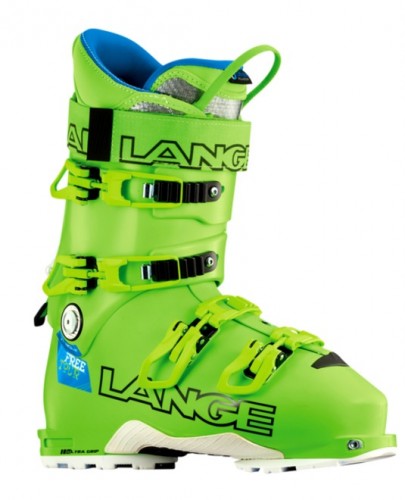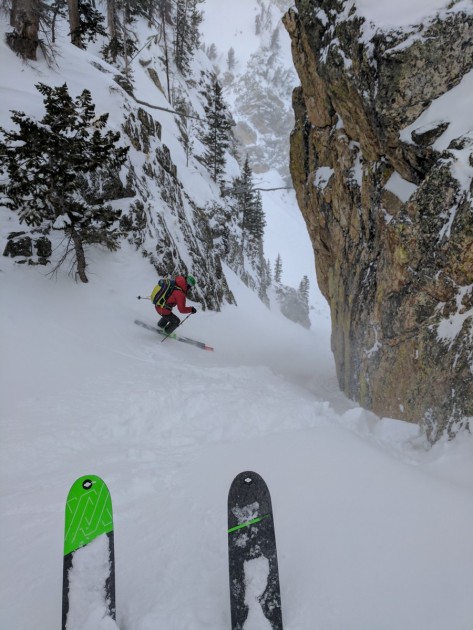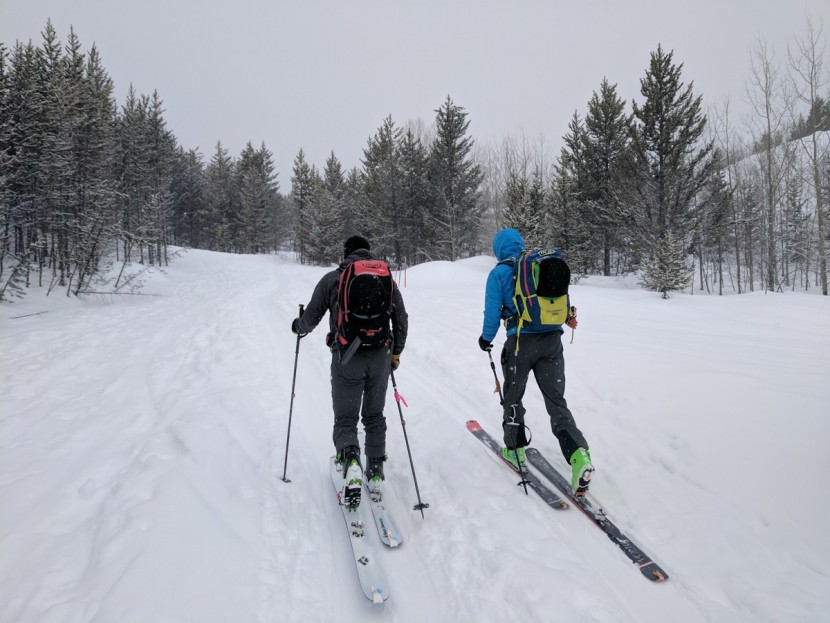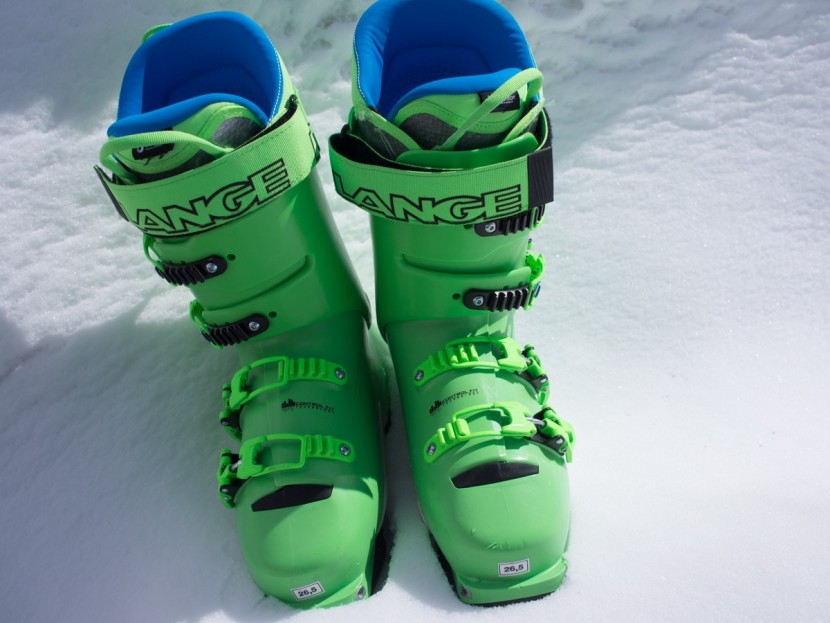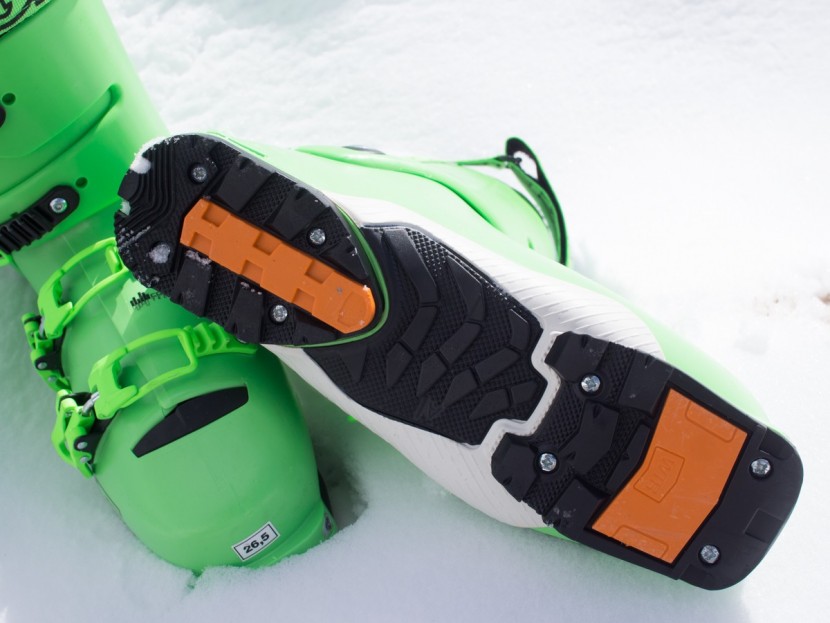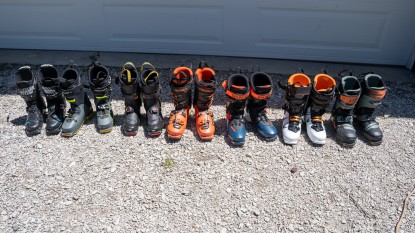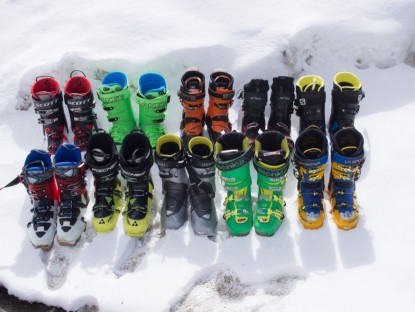Lange updated the Freetour, and it is now called the XT Free 130. Read about the changes below.
February 2019Lange XT Freetour 130 Review
Our Verdict
Our Analysis and Test Results
Updated Boot
The XT Freetour 130 has become simply the XT Free 130. Changes to this boot mostly pertain to the Dual Core Light construction, which sandwiches a harder layer of Grilamid between two softer layers, a design created to provide a more progressive and smoother flex. The new boots come with ISO 5355 sole blocks as well as WTR soles. Compare the new XT Free 130 (first photo) with the old Freetour (second photo), below.
We link to the new version in this review, but as we haven't tested the latest version yet, be aware that the text that follows still refers to last year's Freetour.
Hands-On Review of the XT Freetour 130
Lange is a ski boot company. They make nothing else. For this, we applaud them. In a world of “vertical integration”, where every company seems bent on taking over the world, it is refreshing when one outfit focuses. For years and years, even as the AT ski business boomed, it seemed that Lange would stay focused on alpine only boots. We, for one, are thankful that Lange has bucked this inertia and decided to enter the AT ski boot market. Their XT FreeTour 130 brings alpine performance with just a touch of touring functionality to make it a specialized backcountry downhill ski tool for the modern market. This is an alpine ski boot that tours. Nothing else.
Uphill Performance
This is an alpine ski boot that also tours (though not nearly as well as the other products in our test, but it doesn't pretend to). The “walk mode” has limited range and a great deal of friction. The fore-aft walk mode flexion of the FreeTour is the lowest in our entire test, and the associated friction of the tight pivot rivets and closely engineered ski/walk mode switch makes for a tool that, even in walk mode, feels like an alpine boot. This is ok. In fact, our lead test editor and dyed-in-the-wool “touring dork” has had his whole world upended by the Lange XT.
Jed came to this AT ski gear review through the back door. He nordic skied as a kid, learned telemark in the 90s when that was the best way to access the backcountry, and was an early adopter of tech style bindings and “skimo race” style boots for all-around ski touring. He's never skied in boots weighing more than 7 pounds. He's never skied in overlap cuff boots. He's never skied in boots he couldn't drive a stick shift with. His downhill skiing shows it, but he's a dedicated human-powered skier. His gear choices have always been in that vein. Now, when we “forced” him to try these Lange boots, he wasn't stoked.
What he found, however, was that the limited touring range wasn't all that bad. For your normal, skin-accessed, largely straight up, and straight down ski touring, he hasn't noticed any real drawbacks to the touring mode of the Lange. Even if the downhill skiing performance weren't so much better, he could forgive the compromises in uphill efficiency. That is high praise. Now, let us qualify this. For flat approaches, for huge days, and for any sort of non-skinning (cramponing, walking, scrambling), the limited cuff mobility will indeed be noticed. In those settings, situations in which most backcountry skiers will find themselves from time to time, the XT Freetour boots will not be ideal. That is the reason we recommend lighter and more flexible products for all-around use. The uphill performance of the XT Freetour isn't bad, but the others are much better.
Weight
These are among the heaviest boots in our test. That weight comes correlated with excellent downhill performance, but it makes touring, walking, and step-kicking harder.
The theme through our entire testing and review of this boot has been one of compromise. Are you willing to compromise some attributes (weight and uphill performance) for another (downhill performance)? That's all you need to ask about these boots.
Downhill Performance
These are the best downhill skiing boots in our test.
There is simply no questioning that assertion. Nor do we really need to explain it much. The Lange is optimized to closely match the downhill performance of ski resort footwear.
Comfort and Fit
The XT FreeTour is one of the rare boots in our test that worked for most testers straight out of the box. Only a few share this honor. All the others required some sort of work to be usable by the bulk of our test team. Now, our test team is pretty resilient. They need to be to swap ski boots one day to the next for long days of ski mountaineering and backcountry skiing. You may very well need to customize any of the boots we didn't.
Further enhancing the value of this model of boot, Lange sells it in a “low volume” version. This version, presumably (we did not test it), offers the same performance attributes with less space inside for a given shell length. This is amazing, and will further sell the boot to those tougher to fit.
Warmth
With almost eight pounds of material around your foot, the XT Freetour is plenty insulating. Even when fit close for downhill performance, as they should be, we found them to be insulating and comfortable.
Ease of Use
To optimize downhill performance, the XT FreeTour is built with “overlap construction”. This means that the entire boot is two pieces. To get in and out of the boot, one must flex overlapping flaps out of the way on both cuff and lower boot. “Three piece” or “tongue constructed” boots have a front tongue that folds out of the way for entry. In short, it is easier to get in and out of tongue boots than overlap boots. In some instances, this difference is unimportant. If you can put your boots on in a warm lodge or hut, it doesn't matter very much. If you are on the tailgate of your car in a cold and windy parking lot or, even worse, in a tent on an expedition, overlap boots can be a battle not worth fighting. For this reason alone, and we know it may seem silly, but trust us, we don't recommend the XT Freetour for overnight ski touring camping.
Otherwise, the four standard buckles, velcro power strap, and tightly engineered walk-mode are familiar and reliable. The external walk mode switches on newer designed boots are easier to operate, but not by much.
One major attribute of the XT FreeTour 130 is its sole. This model of boot is more versatile - in terms of binding compatibility - than any other in our test. Like all the boots we tested, and this is how we tested all of them, the Lange can be used in modern “tech” style touring bindings. These are the best for all sorts of backcountry skiing. Also, the sole of the Lange is built to be compatible (and safe for use) with so-called Walk To Ride (WTR) alpine resort bindings. For use in-bounds, WTR bindings are better than touring bindings. The XT Freetour boots, then, are more versatile for those that want boots for inbounds and out.
Value
These boots, especially considering their high-performance attributes, are rather inexpensive. It must be due to the economy of scale that comes with simply converting an existing alpine boot design, but the end result is a high-performing product at a reasonable price. Additionally, we are confident that the FreeTour will perform at a high standard for a long, long time. There is little to wear out, and the design is proven and unlikely to obsolesce. This is a good value.
Conclusion
These are strong, durable, well-performing downhill ski boots with just a couple concessions to uphill touring. In case it isn't clear by now, we recommend these for that niche of users that highly values their downhill performance and experience. For going fast and hard downhill, on big gear and in tough conditions, the XT Freetour is great.
Other Versions
The XT FreeTour comes in LV (Low Volume) version. As the only boot in our test that does that, it further enhances its award-winning status.


